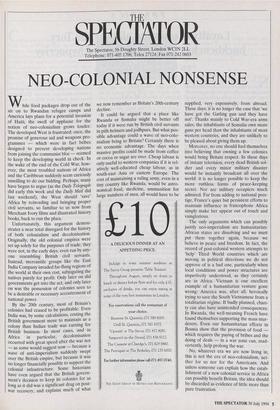SPE THE CTAT OR
The Spectator, 56 Doughty Street, London WC1N 2LL Telephone: 071-405 1706; Telex 27124; Fax 071-242 0603
NEO-COLONIAL NONSENSE
While food packages drop out of the air on to Rwandan refugee camps and America lays plans for a potential invasion of Haiti, the swell of applause for the notion of neo-colonialism grows louder. The developed West is frustrated: once, the promise of generous aid and weapons pro- grammes — which were in fact bribes designed to prevent developing nations from joining the communist bloc — seemed to keep the developing world in check. In the wake of the end of the Cold War, how- ever, the most troubled nations of Africa and the Caribbean suddenly seem curiously unwilling to do our bidding. Perhaps, many have begun to argue (as the Daily Telegraph did early this week and the Daily Mail did last weekend), the West should 'save' Africa by reinvading and bringing proper civil servants, so familiar to us now from Merchant Ivory films and illustrated history books, back to run the place.
Unfortunately, this argument demon- strates a near total disregard for the history of both colonialism and decolonisation. Originally, the old colonial empires were set up solely for the purposes of trade; they were not, in the early days, even run by any- one resembling British civil servants. Instead, mercantile groups like the East India Company invaded far-flung regions of the world at their own cost, subjugating the natives purely for profit. Only later on did governments get into the act, and only later on was the possession of colonies seen to be a desirable or necessary accoutrement of national power.
By the 20th century, most of Britain's colonies had ceased to be profitable. Even India was, by some calculations, costing the British government more to maintain as a colony than Indian trade was earning for British business. In most cases, and. in Africa in particular, decolonisation occurred with great speed after the war not — as some would suggest now — because a wave of anti-imperialism suddenly swept over the British empire, but because it was no longer financially possible to support.the colonial infrastructure. Some historians have even argued that the British govern- ment's decision to keep its colonies for as long as it did was a significant drag on post- war recovery, and explains much of what
we now remember as Britain's 20th-century decline.
It could be argued that a place like Rwanda or Somalia might be better off today if it were run by British civil servants in pith helmets and jodhpurs. But what pos- sible advantage could a wave of neo-colo- nialism bring to Britain? Certainly there is no economic advantage. The days when massive profits could be made from coffee or cocoa or sugar are over. Cheap labour is only useful to western companies if it is rel- atively well-educated cheap labour, as in south-east Asia or eastern Europe. The cost of maintaining a ruling army, even in a tiny country like Rwanda, would be astro- nomical: food, medicine, ammunition for large numbers of men, all would have to be supplied, very expensively, from abroad. These days, it is no longer the case that 'we have got the Gatling gun and they have not'. Thanks mainly to Cold War-era arms sales, the inhabitants of Somalia own more guns per head than the inhabitants of most western countries, and they are unlikely to be pleased about giving them up.
Moreover, no one should fool themselves into believing that owning a few colonies would bring Britain respect. In these days of instant television, every dead British sol- dier and every minor military disaster would be instantly broadcast all over the world: it is no longer possible to keep the more ruthless forms of peace-keeping secret. Nor are military occupiers much admired. Far from adding to national pres- tige, France's quiet but persistent efforts to maintain influence in francophone Africa simply make her appear out of touch and vainglorious.
The only arguments which can possibly justify neo-imperialism are humanitarian: African states are dissolving and we must put them together again, because we believe in peace and freedom. In fact, the record of post-colonial western attempts to `help' Third World countries which are moving in political directions we do not approve of is a bad one, particularly when local conditions and power structures are imperfectly understood, as they certainly are in Africa. Vietnam is one excellent example of a humanitarian venture gone wrong: America was, after all, heroically trying to save the South Vietnamese from a totalitarian regime. If badly planned, chari- ty can also have unintended consequences. In Rwanda, the well-meaning French have found themselves supporting the mass mur- derers. Even our humanitarian efforts in Bosnia show that the provision of food which requires the paying of bribes and the doing of deals — in a war zone can, inad- vertently, help prolong the war.
No, whatever era we are now living in, this is not the era of neo-colonialism, nei- ther for us nor for the Americans. And unless someone can explain how the estab- lishment of a new colonial service in Africa can possibly benefit Britain, the idea should be discarded as evidence of little more than pure frustration.


















































 Previous page
Previous page